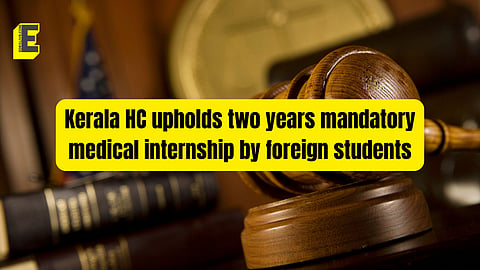

Kerala High Court (HC) upheld the Kerala State Medical Commission's notification mandating two two-year Compulsory Rotating Medical Internships (CRMI) to foreign students who missed offline classes due to COVID-19 and the Russia- Ukraine war.
Justice CS Dias noted, "On an evaluation of the facts, the materials, and the law, especially on finding that there are no materials to substantiate that the petitioners had undergone their last year of study during the COVID-19 pandemic in the offline mode, I do not find any valid ground to hold that the decision is arbitrary or oppressive."
"The stipulation has been incorporated in the larger public interest to ensure that foreign medical graduates are granted permanent registration only after getting adequate practical training as they were unable to attend classes due to the pandemic or the war," said Justice CS Dias, stated a report by The New Indian Express.
The court issued the order on the petition filed by Thahiya Thasleem VS of Aluva and others seeking to quash the notification. The petitioners stated that they had undergone a Master of Medicine course at the Odessa National Medical University, Ukraine, equivalent to the MBBS course in India.
The petitioners did their six-year graduation program from June 2016 to May 2022.
The Kerala State Medical Commission has provided provisional registration to the petitioners, valid for two years from the date of registration. However, in Note 3 of the certificates, it is stipulated that the petitioners have to undergo the CRMI for two years. When a statutory provision stipulates only one year, the same cannot be changed by an executive decision.
Additionally, in states like Rajasthan, Haryana, Tamil Nadu, and Telangana, similarly situated candidates are permitted to apply for permanent registration upon completion of a one-year CRMI.
So, the insistence on the two-year CRMI is untenable by the state is untenable.
Kerala State Medical Councils informed the court that foreign medical graduates would be eligible for permanent registration only after completing the two-year CRMI. It also stated that the petitioners have not produced any material to establish that they have adequately compensated the online classes by attending classes offline.
There are two categories of students — those who left their universities, returned to India and attended classes through online mode due to the COVID-19 pandemic and the Russia-Ukraine War, stated the The New Indian Express report.
The court held that there was no illegality in the condition, Hence the petitions are dismissed.
